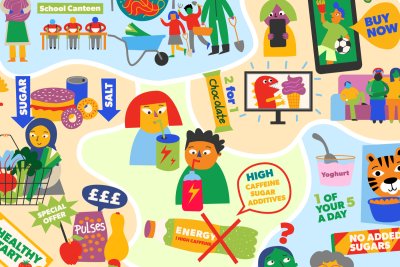News • Sustainable Food Places
1 child in every 20 in the UK going hungry and reliant on food banks to eat
New campaign from Sustainable Food Cities calls for commitment to tackle the problem ‘Beyond the Food Bank’
- New campaign calls for commitment to tackle the problem Beyond the Food Bank
New Trussell Trust figures released this week show that more than one million people - including almost 400,000 children - turned to food banks in the past year. These are unprecedented numbers, up 19% over last year.
In response the Sustainable Food Cities network, a coalition of cities taking a joined up approach to tackling food issues, is urging national and local government to ensure that everybody has the chance to eat an adequate, nutritious diet. Rather than focusing on charity-based solutions, Beyond the Food Bank calls for action to reduce benefit delays, review how benefit sanctions are being implemented, and eliminate unnecessary hardship, hunger and distress. It is calling on more people to sign their Food Poverty Declaration to put pressure on Government to take action.
Professor Elizabeth Dowler, Warwick University, says “I welcome this call for Government Action on Food Poverty at national and local levels. Food poverty cannot be sustainably addressed through charitable response or the redirection of surplus, ‘waste’ food. Improving employment practice would go a long way to reducing wage and working condition inequities which contribute to food poverty; practical support for local food enterprise, including producers, would strengthen local food economies. Entitlements to sufficient, healthy food through schools and social care play a critical role in ensuring access to good food for those unable to shop and prepare their own meals. All should be able to enjoy sustainable food, now and in the future.”
Hannah Laurison, Sustainable Food Cities campaign coordinator, commented: “We are getting more and more cities signing this declaration. These are cities where partnerships of local authorities, charities, businesses and community groups, are working to extend the safety net to reach the most vulnerable and increase access to healthy, affordable food. We believe that publicly-funded nutrition programmes, such as Healthy Start Vouchers, Free School Meals, and Meals on Wheels, must take on a bigger role in keeping families and older people out of crisis.”
Cities in the network are taking a number of innovative approaches to alleviating food poverty:
• Brighton & Hove Food Partnership provides food poverty advice and resources for advisors and health professionals
• Bridgport FoodFuture partners has developed a directory of eating opportunities, including meals delivery, lunch clubs, shopping services and foodbanks
• Nottingham city has studied gaps in the uptake of Healthy Start vouchers and identified solutions to increase accessibility.
Laurison continued, “But cities can’t go it alone. With food bank use climbing steadily at 19% per year, urgent action is needed to get at the root causes of food poverty. Which is why we’re calling on the next Government to take immediate and effective action to tackle low pay and address benefits delays and sanctions.”
The Sustainable Food Cities Network will work with cities to advocate for these changes to those in Westminster while also nurturing local innovation to increase access to healthy, affordable food and ensure that good practice is shared across the Sustainable Food Cities Network.
Ends
For press enquiries please contact Hannah Laurison, hannah@sustainweb.org, 07454 151229
Notes
1. The Sustainable Food Cities network is an alliance of public, private and third sector organisations using food as a vehicle for positive change. The Network helps people and places to share challenges, explore practical solutions and develop best practice in all aspects of healthy and sustainable food. It is coordinated by Food Matters, Soil Association and Sustain, and is funded by the Esmee Fairbairn Foundation.
Sustainable Food Cities programmes take a cross sector partnership approach across six key areas:
1. Promoting healthy and sustainable food to the public
2. Tackling food poverty, diet-related ill health and access to affordable healthy food
3. Building community food knowledge, skills, resources and projects
4. Promoting a vibrant and diverse sustainable food economy
5. Transforming catering and food procurement
6. Reducing waste and the ecological footprint of the food system
For more information about Sustainable Food Cities visit www.sustainablefoodcities.org or on Twitter follow: @foodcities
2. About Beyond the Food Bank Food Poverty campaign: Through the Beyond the Food Bank campaign, the Sustainable Food Cities Network will champion strategies that address the root causes of food poverty, reverse demand for emergency food assistance, provide a publicly-funded safety net for the most vulnerable and ensure that low-income households can afford and access good food. See the Sustainable Food Cities food poverty declaration here.
Published Friday 24 April 2015
Sustainable Food Places: The Sustainable Food Places Network helps people and places share challenges, explore practical solutions and develop best practice on key food issues, so if you are working to drive positive food change or are interested in developing a programme, please do get in touch.





